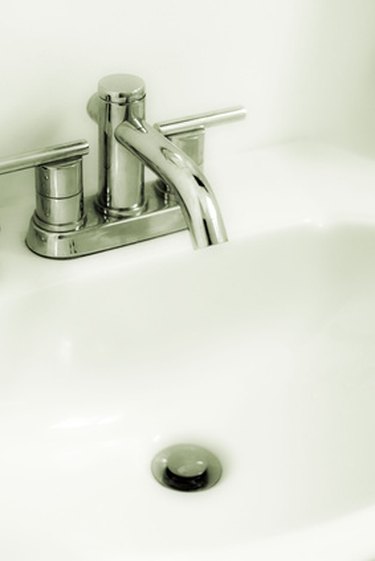
Plumbing for a faucet combines hard pipe with flexible pipe. The flex line allows the water pipe to connect to the faucet without struggling to get everything lined up perfectly. Flex line is a braided hose that is available in numerous lengths and connections used in sinks and tubs. A line that is too long is not that big of an issue.
Replace the Line
Video of the Day
Flex lines connect to the hard pipe and faucet with simple screw-on connections. A pair of adjustable pliers easily disengages the connections, allowing you to pull the flex line free. The water shutoff valve should be positioned directly beneath the connection of the hard pipe and flex line. Turn the water off, and disconnect the line. Measure the distance from the connection to the faucet connection. The flex line necessary will be a few inches larger than the measured distance. Installation is the opposite of removal.
Video of the Day
Ignore the Length
The length of the flex line is immaterial. When the shutoff valve on the water pipe is opened to allow water into the line, the water builds up pressure in the flex line regardless of the length. The hot water may be delayed for one or two seconds, but the water pressure will be unaffected. The only downside to a longer-than-necessary flex line is that the line will bunch up beneath the sink, taking up some valuable room. The only real requirement for the length of the flex line is that it cannot be too small.
Replace the Line With Alternate Piping
Flex line is the most flexible option for under-sink connections, but it can take up a lot of space. An alternative is flexible plastic pipe. Plastic pipe does not have the ability to loop or bend substantially but can be curved slightly to accommodate misaligned pipes. Plastic lines are customized to the size necessary for the job. A pair of tin-snips will cut the line to the proper size. The connections use compression fittings. Installation requires inserting one end into the lower pipe and cutting the top end to fit the upper pipe. You slide the compression fittings, which include a plastic washer and a nut, onto the pipe. Tighten the nut down onto the faucet or water pipe, which compresses the plastic washer, sealing out leaks.
Swap the Flex Pipe
Rarely is there just one sink in a house. Every sink, tub and toilet in the house likely uses flex pipe to connect the faucet to the water pipe. If the length of the flex line beneath the sink in question is too long and takes up valuable space, compare the length to other sinks or tubs that use flex line. The important aspect to compare is the length and the size of the connections. Most connections will be 1/2 inch, but that is not a guarantee. Identify a flex line of a suitable length in a location that could benefit from a longer hose or that has less needs for space saving. Swap the flex lines.